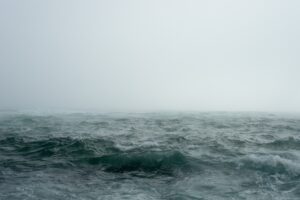Dark clouds, brutal gusts of wind, white caps, flash floods, and pelting rain…it’s all in a day on the lake. This particular year however, it’s been occurring a lot more frequently on the Colorado River that runs right through the Mojave Desert. And our little escape to the lake, is right in the middle of that!
While there aren’t alien sightings (even though we are only about 130 miles from area 51 and the extraterrestrial highway), there is an eerie serenity and the realization of how small and helpless one could be against the enormous power mother nature can release on you without much warning.
I speak of these recent monsoons and flashfloods from personal experience as the last two family trips we had out there has to do as much with planning, preparation, and contingencies for inclement and furious weather conditions as I do for the financial planning with my clients. Navigating open waters and financial planning really do have a lot in common!
If you have read the meaning behind the word “Arktos” and the reason I selected it as the name for my wealth management firm, you would realize that Arktos is fitting for both of my passions; guiding my crew safely on the waters of the world, and guiding my clients on a successful financial journey through their lives. As the one constant and reliable indicator to navigation that it is, here is a description of Arktos:
The name Arctic comes from the Greek word “arktos”, meaning “bear”. It refers to the constellation Ursa Major, or Great Bear, which appears in the northern sky.
The Big Dipper is part of the Great Bear constellation and it guides the way to the North Star (Polaris) – an important navigational guide (when you are facing Polaris, you are always facing north). You will notice from the diagram that the “bowl” of the dipper becomes the “saddle” on the bear.
The knowledge of how to use the North Star in navigation has been known to people in the Northern Hemisphere (the only part of the world where Polaris is visible) for well over 2,000 years, and it gave them a great advantage when it came to travel, trade, and sharing of information. This constellation is the key to finding that star.
When I’m boating on Lake Mojave, I don’t have to find the north star to know where I am. This comes from a lifetime of navigating that lake by pilotage (using visual indexes to know your location) and the experiences of knowing depths, underwater obstructions, and distances to various locations. In short, I know the lake like the back of my hand.
But what has happened over these past two summer trips has really tested all of my (and my family’s) proactive nature to anticipate weather shifts, wind direction, anchorage stability, when to drop the shade on the beach, safety from flying objects, getting sandblasted, and 3-foot swells that can throw a good sized boat up onto the beach (or sink it). To prepare, we bring extra lights, a LifeStraw, extra fluids, food, an extra anchor, ropes, carabiners, the knowledge of how to tie proper knots, sand bags to hold things down, extra life vests, a channel 16 radio, knives, a shovel, goggles for diving to retrieve or untie ropes caught under the boat, and many other items that have nothing to do with “just having a great day on the lake.” In short, we try to be prepared for whatever mother nature throws at us.
On this last trip in particular, my wife and I got caught in the heaviest rain storm I have ever been in. After being able to break off from anchor due to our precarious setting on the beach, we powered our way out to the middle of the lake. It was at this same time, that a houseboat on our same beach lost a battle against the winds, got turned sideways, and pushed up on the shore! As we motored our way out, the skies were dark (yes, dark in the middle of the day), streaks of lightning were touching down on the shores around us, and thunder was cracking directly over us. Meanwhile the heaviest rain storm, a furious white curtain of solid pelting rain, was headed directly towards us from across the white capped lake.

While having nearly zero-distance of vision, we kept our heads down in the boat in attempt to not attract lightning. We set an anchor (storm style-to keep the nose pointed into the waves and wind) in the middle of a cove just off the center channel while bouncing in 2-3 foot chop. The boat’s bilge pump was running almost constantly for 45-minutes due to rain bringing water in faster than it could pump out. I knew that our boat could hold and ride this out, but it was a test of our ‘plan B.’ Eventually, this storm passed and we were able to return to the beach to set a double anchor (redundancy in prep for more wind) and try to relax for the rest of the day.
As seemingly contrasting boating is to financial planning and investment management, they actually align very closely. Both require proper planning, learning to ride out unpredictable times, having a contingency plan, and to leave several more options available if things don’t go exactly as planned. A multitude of details make up both events (boating and financial planning) and they sometimes require a comprehensive list of action items that should or must be completed in order to give yourself the best chance of success in either – a nice day on the water, or having a sufficient amount of income in retirement.
The pandemic of 2020, the Russia/Ukraine war, the worst start to the stock and bond market in more than a 40-years (note: The Wall Street Journal said bonds had their worst start since 1842), and goods and services that are costly and scarce at the same time, have begun to separate those who are or were able to anticipate changes in economic conditions. Those who prepared and possibly anticipated for a market correction or increased cost of living may have set or adjusted their sails (boat analogy again) accordingly.
Some scholars say we are headed towards a deep and protracted recession. Others say the worst is behind us and we’re going up from here. And other financial prognosticators say the chance of a moderate recession in the next 12-months is around 50%. Does it even matter ‘who’ is right? Or would you be better served by making some decisions based on all the information you receive and ‘prepare’ for the what-ifs? Could you start to cut back on frivolous spending? Could you save more cash for emergencies? Could you reposition your assets so the risk corresponds to your timeline? Of course you can! But many people choose to let fate determine their destination instead of taking action to control risk exposures.

So as I continue my passion of enjoying fun on the water, I also continue my similar passion as a Certified Financial Planner™ in helping to successfully guide my clients from point A to their chosen point B. Let’s just keep an eye out and have a plan for any dark clouds off in the distance! Do as the Greeks did more than 2,000 years ago, and use Arktos as your guide!
